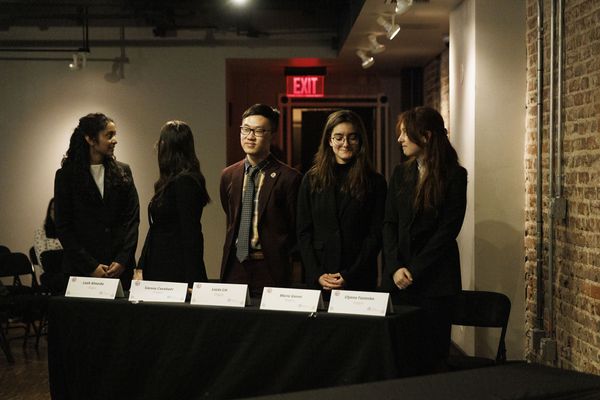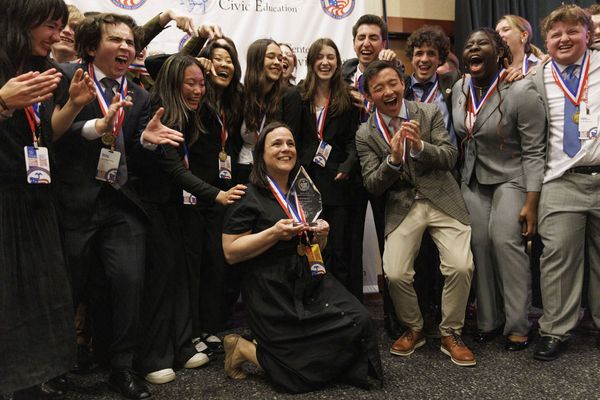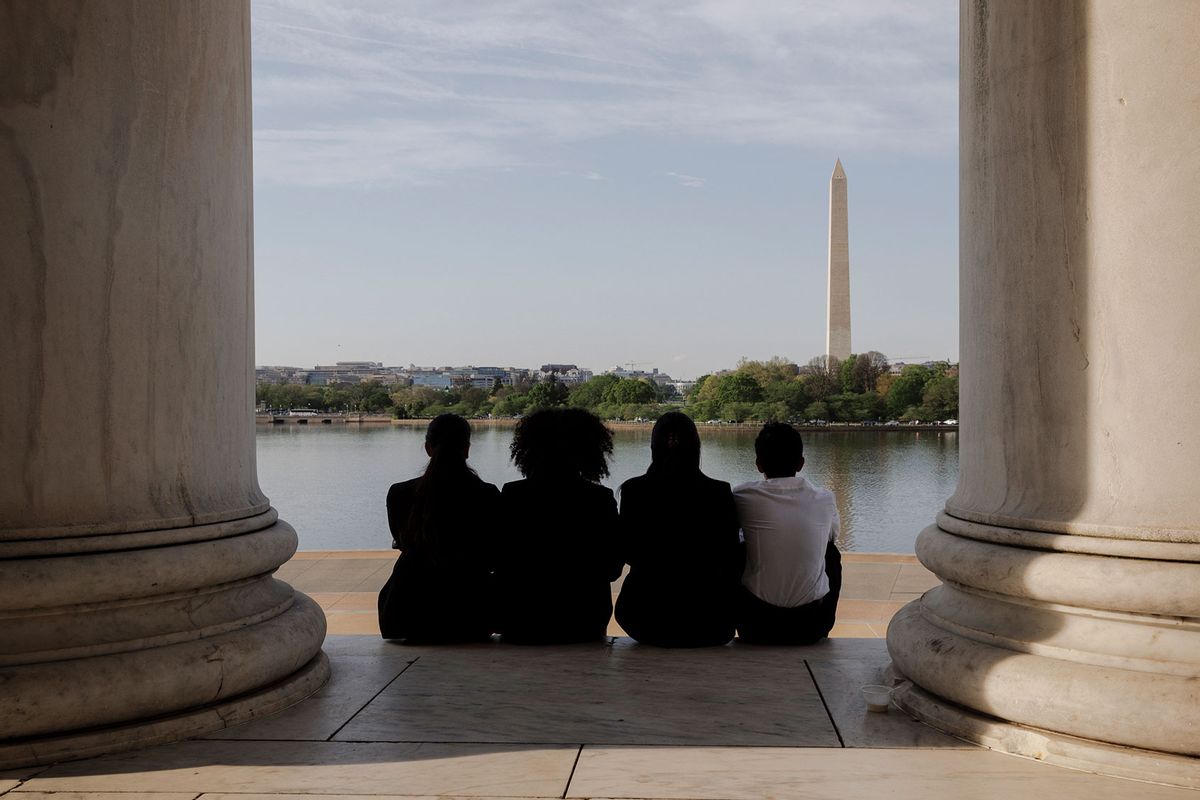PBS could not have wanted for better organic, coincidental advertising for its four-part series “Citizen Nation” than Oakland University student Marcus Johnson’s instant virality following the vice presidential debate.
The political science student succinctly blew apart JD Vance’s attack line on Vice President Kamala Harris for neglecting to make any significant changes while she’s held office, by pointing out something so simple that few if any fact checkers bothered to mention it.
But it needed to be said, he told MSNBC’s Jacob Soboroff in a post-debate interview. “If anybody took high school civics class, they’d know what the vice president can do and what the vice president can’t do. . . that’s not how the vice presidency works," Johnson fumed. "You don’t get to what you want, you do what the president delegates you to do.”
Social media celebrity can be fleeting, but seeing Johnson’s social media following swell after dropping basic knowledge to a cable news reporter shows how desperate we are for evidence of informed common sense.
In speaking with Soboroff’s MSNBC colleague Joy Reid the next day, Johnson humbly shouted out his high school civics teacher while explaining, “I actually am one of the rare people that have looked at the Constitution every now and again. So I get a lot of knowledge from there.”
If only some of Johnson’s promotional electricity could have been redirected toward boosting “Citizen Nation,” a riveting show about civics-minded students like him.
The four-part “Retro Report” documentary takes us into the lives of dozens of young men and women studying the United States Constitution as part of their curriculum, to prepare them for the national civics competition known as “We the People.”
Over 10 months “Citizen Nation” producers followed students in Wisconsin, Nevada, Wyoming, West Virginia, New Jersey and other states, as they learned to apply the Framers’ intentions to current event scenarios.
The national contest, held in Washington D.C. each year, tests the students’ knowledge of our system of governance and democracy as judges pepper them with questions in a forum meant to emulate congressional hearings. Its goal is to instill a lasting understanding of how our democracy’s foundational document guides our governance and principles.
 Citizen Nation (PBS)What moves “Citizen Nation” are the multiple profiles of students and teachers hailing from an array of communities across the country, all of whom are as motivated to use what they learn to empower themselves to be more engaged in our democracy as they are to take top ranking in the national contest.
Citizen Nation (PBS)What moves “Citizen Nation” are the multiple profiles of students and teachers hailing from an array of communities across the country, all of whom are as motivated to use what they learn to empower themselves to be more engaged in our democracy as they are to take top ranking in the national contest.
“I think that teaching students to critically think about government helps them better find their way into society,” says Sheridan, Wyo., teacher Mike Thomas. “I just want to create better citizens: better thinkers, more engaged citizens. That, to me, is much more important than anything else.”
We need your help to stay independent
Producers follow “We the People” teams from schools that are amply funded and expect to win and others whose teachers and administrations bootstrap it through their preparations. Some of its featured kids have stable family lives. Others live on the economic margins and are barely holding on. A few are working to support their families while attending school. All profess a strong belief that they’re sowing the seeds for a better future; some say it to urge themselves onward.
Through these individual stories, "Citizen Nation" constructs a quilt of resilience and hope, even in painful moments. Thomas’ fellow Wyoming instructor Erin Lindt gives so much of her soul to her scrappy class of economically disadvantaged kids that it takes a toll on her marriage.
Another teacher in West Virginia merrily encourages the students in his working-class mining town to show their personalities and be diligent. After school, the camera follows him to the privacy of his car where he lights up a Pall Mall and crumbles, burned out by the job and the crush of having to care for ailing parents.
Those people know we’re counting on their students to steer our collective ship out of its tailspin, commanding an emotional investment in these four episodes. Corny as it may be to say that you’ll want every kid in this show to win, that is true. Each has valuable reasons for taking the competition seriously beyond the fact that it will look great on college applications.
 A team celebrates at the We the People national championship in Leesburg, Va. (Moriah Ratner/Retro Report/PBS)One young woman in Las Vegas, the daughter of Nigerian immigrants, is moved to tears as she describes finding out that her father, a University of Nevada Las Vegas professor, was wrongly imprisoned for two years when she was too young to understand what was happening. For her, learning the intricacies of the Constitution is a life mandate – she already knows she doesn’t want other little girls to go through what she did.
A team celebrates at the We the People national championship in Leesburg, Va. (Moriah Ratner/Retro Report/PBS)One young woman in Las Vegas, the daughter of Nigerian immigrants, is moved to tears as she describes finding out that her father, a University of Nevada Las Vegas professor, was wrongly imprisoned for two years when she was too young to understand what was happening. For her, learning the intricacies of the Constitution is a life mandate – she already knows she doesn’t want other little girls to go through what she did.
Another student in Oregon admits she didn’t care about the Constitution at all until she began studying it. Now she waxes appreciatively about the beauty in John Adams’ writing.
Want a daily wrap-up of all the news and commentary Salon has to offer? Subscribe to our morning newsletter, Crash Course.
Some participants want to go into politics. Some simply want to have an unassailable knowledge of their rights. But a ubiquitous concern is that the American public's alarming refusal to find compromise with people who hold opposing political viewpoints has brought us to a dangerous impasse.
Lindt opens the series by expressing her fear of what we as a nation have become as her reason for teaching her students about the Constitution’s meaning as a unifying force. “You want kids who have experienced life to be your next generation of problem solvers,” she says.
“Citizen Nation” vibrates with the same earnest energy that made 2002’s spelling bee documentary “Spellbound” so memorable, although where that documentary uses its competitors’ stories to test whether hard work and self-assuredness are surefire keys to success, this series doesn’t bother with such fantasy.
Not every student that “Citizen Nation” monitors will win in this round of the contest or, possibly, in life.
Ultimately, triumphing in a high school contest isn’t the point. Everyone, adults and kids alike, is invigorated in knowing that what they’ve learned in the program will remain with them far beyond high school. “It’s intense,” says one “We the People” participant, “but I’ve never felt smarter in my life.”
New episodes of "Citizen Nation" air at 9 p.m. Tuesdays on PBS member stations and are available to stream at PBS.org and on the PBS app. Check your local listings.
Read more
about this topic



Shares